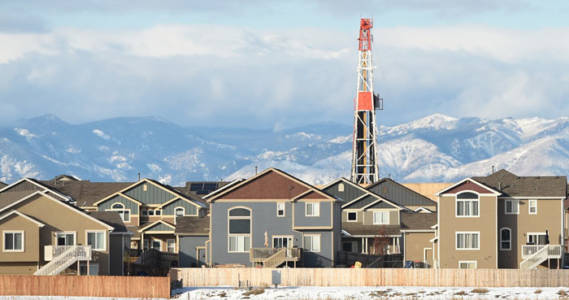
Neighborhood fracking in Colorado
The Colorado Oil and Gas Conservation Commission is moving forward on a hearing for a rulemaking petition submitted on August 30 by six environmental groups, opening the matter up for public comment from individuals and groups. Comments will be accepted until December 2, in preparation for a December 14 hearing. The petition from the groups formally asked the Colorado Oil and Gas Commission (COGCC) to make new rules to protect Coloradans from the oil and gas industry’s contribution to ozone pollution, climate change, and toxic pollution in disproportionately impacted communities.
The COGCC has a mandate enacted in 2019 by SB 19-181 to evaluate and address potential cumulative impacts of oil and gas development. In over three years since SB19-181 passed into law, the Commission has adopted rules to evaluate cumulative impacts, but enacted only a handful of rules to address them. Rules currently address a small subset of local cumulative impacts such as dust, noise and light. The petitioners demand the COGCC make rules to address the regional and state cumulative impacts of ozone and climate change and to increase local protections against air pollutants, especially in disproportionately impacted communities.
This rulemaking petition from 350 Colorado, WildEarth Guardians, Womxn from the Mountain, Physicians for Social Responsibility, The Larimer Alliance, and Sierra Club of Colorado includes several proposed rules, including;
- A definition of cumulative impacts that includes “total effects on a resource, ecosystem, or human community” and takes into consideration “all other activities affecting that resource no matter what entity… is taking the actions.”
- Equity analyses for projects proposed in or near disproportionately impacted communities with rules preventing approval if the proposed projects will increase the cumulative pollution levels of disproportionately impacted communities.
- Rules to prevent approval of permits in any area if the pollution they create will put the local area above health-based standards for NAAQS substances and HAPs.
- Rules to prevent certain high-emitting oil and gas activities during ozone season or on high-ozone days.
- Rules to prohibit new oil and gas permits if the State has determined we are not meeting our greenhouse gas reduction targets.
- Rules to prohibit new permits in areas of the state that are already experiencing average annual warming of over 1.5 degrees Celsius.
Many oil and gas operations occur in areas already heavily impacted by other pollution sources. For example, many existing and planned oil and gas projects are located in the Denver Metro-North Front Range ozone nonattainment area, where ozone pollution is caused cumulatively by many sources. Oil and gas contributes to this problem by emitting the most ozone precursor substances by far, yet the Commission has not yet considered rules for curtailing oil and gas activities in ozone nonattainment areas. Commission rules also do not require analysis to show whether proposed projects will put local air pollution above health-based standards.
“The Commission thinks it can solve this problem by making sure each well is emitting as little pollution as possible,” says Heidi Leathwood, 350 Colorado Climate Policy Analyst. “But adding pollution drop by drop to a glass that is already full, while ignoring the fact others are also adding drops to the glass just doesn’t make sense. Almost 4000 new permits have been granted since the mandate to address cumulative pollution was passed in 2019.”
Multiple recent independent studies have found that the American West is currently experiencing a mega-drought that is the worst in the past 1,200 years and point to human-caused climate change as much of the cause. The warming in Western Colorado is more than double the national average, putting the area at even greater risk. Much of Colorado’s cumulative pollution puts an unjust burden on historically marginalized low-income communities and people of color, further amplifying the urgency to address the issue.
Though groups have heard concerns that protecting Coloradans health through regulation may lead to higher fuel prices, they point out that there is little connection between Colorado regulation and local fuel prices.
“Colorado’s production does not meaningfully change the price that Colorado consumers pay for fuel — it’s a global commodity with prices set by the balance of global demand and global production plus industry profiteering — but our bad air quality does cost Coloradans in health spending, in lost life and lost productivity,” says Kate Merlin, WildEarth Guardians’ Climate and Energy Program Attorney. “It hurts our tourism industry. It hurts our most vulnerable people: children and the elderly. It also hurts folks who work outside, like postal carriers, road crews, and farm and ranch workers.”
This environmental coalition is calling for the Commission to make rules to protect Coloradans from the oil and gas industry’s contribution to cumulative air pollution impacts, while prioritizing disproportionately impacted communities. The coalition acknowledges that there are many other cumulative impacts that will also need to be addressed. Members of the public can find information about how to comment on this hearing notice.
Want to take action and offer public comment? Check out this Toolkit: submitting comment in support of a rulemaking for Cumulative Impacts
